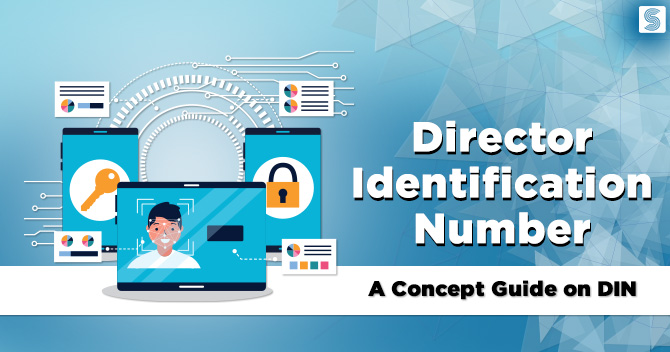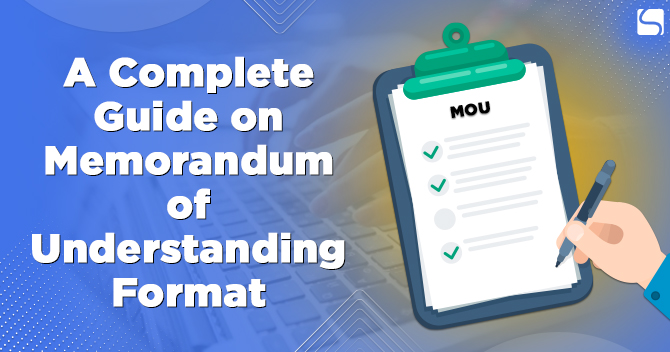Director Identification Number: A Concept Guide on DIN

Shivani Jain | Updated: Jul 01, 2020 | Category: Compliance
Although a company is a legal person, it does not have any physical appearance to carry out its work and operations. Shareholders or the owners of a company need to appoint Directors, who will be responsible for running a company. These directors maintain a fiduciary relationship with the company. However, every person proposed to be appointed as Directors needs to acquire the Director Identification Number (DIN).
Table of Contents
Concept of DIN
A DIN or Director Identification Number is an 8-digit Unique Director Number. Central Government allots this number to each individual who wants to become a Director. An already acting director also needs to obtain DIN from the Central Government.
A person can have only one DIN number. However, he is eligible to become director of two or more companies. A Director Identification Number has lifetime validity. Through a DIN government can maintain a database of all the directors.
The concept of this Identification Number was introduced in section 266A to 266G the Companies (Amendment) Act, 2006. A director of a company while signing documents like Annual Return needs to mention his DIN below his signature as well. Further, the fee charged for obtaining DIN is Rs 500.
Latest Update as on 24.03.2020
All the DIN holders named as “Deactivated” can file e-form DIR-3 KYC or form DIR-3 KYC-Web by 30.09.2020. These holders can submit this form without paying the fees of Rs 5000.
Further, the companies termed as ‘ACTIVE Non-Compliant’ can file e-form ACTIVE up to 30.09.2020. These holders can submit this form without paying the fees of Rs 10000.
Forms Required Apart from Spice Form
| Form Number | Purpose |
| Form DIR-3 | Application for the Allotment of DIN |
| Form DIR-3C | Intimation of Identification Number by Company to the ROC (Registrar of Companies) |
| Form DIR-5 | Application for Surrendering Identification Number |
| Form DIR-6 | Application for Modifying Details submitted in Form DIR-3 |
Documents Required under the Companies Act, 2013
The documents required to be filed with the Ministry of Corporate Affairs (MCA) along with the DIN Application are as follows:
- With SPICE Form: Any individual intending to become a director for the first time needs to make an application in e-Form SPICe. The supporting documents required to be filed with SPICE Form includes the following:
- Identity Proof in the form of Aadhar Card, Voter ID, or PAN Card;
- Address Proof in the form of Utility Bill;
- With Form DIR-3: Any person who wants to become a director in an existing company needs to make an application in e-Form DIR-3. The documents required for the same can be summarised as:
- Photograph:
- Proof of Identity in the form of Aadhar Card, Voter ID, or PAN Card;
- Residence Proof in the form of Utility Bill;
- In the case of Foreign Nationals, a copy of the Passport.
- Verification Details:
- Applicant’s Name;
- Father’s name;
- Current Address;
- Date of Birth;
- Declaration Text;
- A physical signature of the applicant.
The Procedure to obtain Director Identification Number
In India, the legal provisions regulating the DIN are as follows:
- Section 153 of the Companies Act, 2013;
- Rule 9 of the Companies Rules, 2014.
Further, the steps involved in the procedure for receiving DIN can be summarised as:
- In the first step, the applicant needs to visit the official website of the MCA [1] ;
- Now select the drop-down menu saying MCA services;
- After choosing the MCA services, search the E-Filing section;
- Next click on the option ‘Company Forms Download”;
- Now on the Next Page, find Form DIR-3 under “DIN Forms”section and download it;
- After downloading the e-form, fill the same with all the details asked;
- Attach a copy of each Supporting Document with the application form;
- Now, the applicant needs to sign all the documents using DSC (Digital Signature Certificate);
- After that, all the documents need to be digitally signed by Company Secretary or Manager;
- The CEO (Chief Executive Officer) or CFO (Chief Financial Officer) to sign the documents digitally;
- Lastly, submit the e-form with the specified fees as per the official instruction.
How is DIN allotted?
The Delegated Authority process and validate the Form DIR-3 filed by the applicant. The regulations considered for validating the DIN can be summarised as:
- 154 of the Companies Act, 2013 [2] ;
- Rule 10 of the Companies Rules (Appointment and Qualification of Director) 2020.
After considering these rules and provisions, the DIN number will be allotted within a month. However, the central government reserve the right to accept or reject the form.
In case the application gets rejected, the authorities will send an e-mail stating the reason for rejection to the applicant. The authorities will also put the reasons on the official website as well.
The applicant will get a time of 15 days to rectify the reasons or objections raised. Further, if the applicant rectifies the reasons and satisfies the authorities, he will be allotted DIN. However, if he fails to rectify, the central government will label the said application as “INVALID”.
Once, a director has received the DIN; he needs to inform about the same to the company. Further, the respected company needs to inform about the Director to the ROC within 15 days of the receipt of knowledge.
Common Causes for the Rejection of Application
In India, the common reasons for the Rejection of Application are as follows:
- Non-Submission of the Supporting Documents:
- The Identity Proof, Residential Proof and DOB of the applicant is not submitted;
- The Identity Proof of the father’s name of the applicant is not submitted;
- The Copy of Passport for the foreign nationals is not submitted.
- Invalid Application or Supporting Documents:
- Expired or Invalid Supporting Documents;
- Any Identity Proof not issued by the government authorities;
- The Application or the evidence enclosed contains handwritten entries;
- Submission of Duplicate DIN Application;
- Submission of Application without the applicant’s photograph;
- Signature not done on the specified place;
- The applicant’s name, father’s name, DOB, and address does not match with the details enclosed in the evidence;
- Gender not specified correctly in Form DIR-3;
- Documents supported are not self-attested.
Modifications of Form DIR-3
The steps involved in the process to modify DIR-3 can be summarised:
- Download and fill the Form DIR-6;
- Now verify the same using a DSC (Digital Signature Certificate);
- Get it digitally signed by the practising Chartered Accountant or Company Secretary;
- Lastly, submit it as per the instructions given on the MCA portal.
Conclusion
DIN is an 8-digit director identification code that acts as a Proof of Identity for a director in a company. Moreover, it is compulsory for every director to have a Director Identification Number. One can obtain his/her Director Identification Number with Swarit Advisors. Our experts will provide you in end-to-end assistance in obtaining DIN hassle-free.
Also, Read:Appointment of Independent Director














